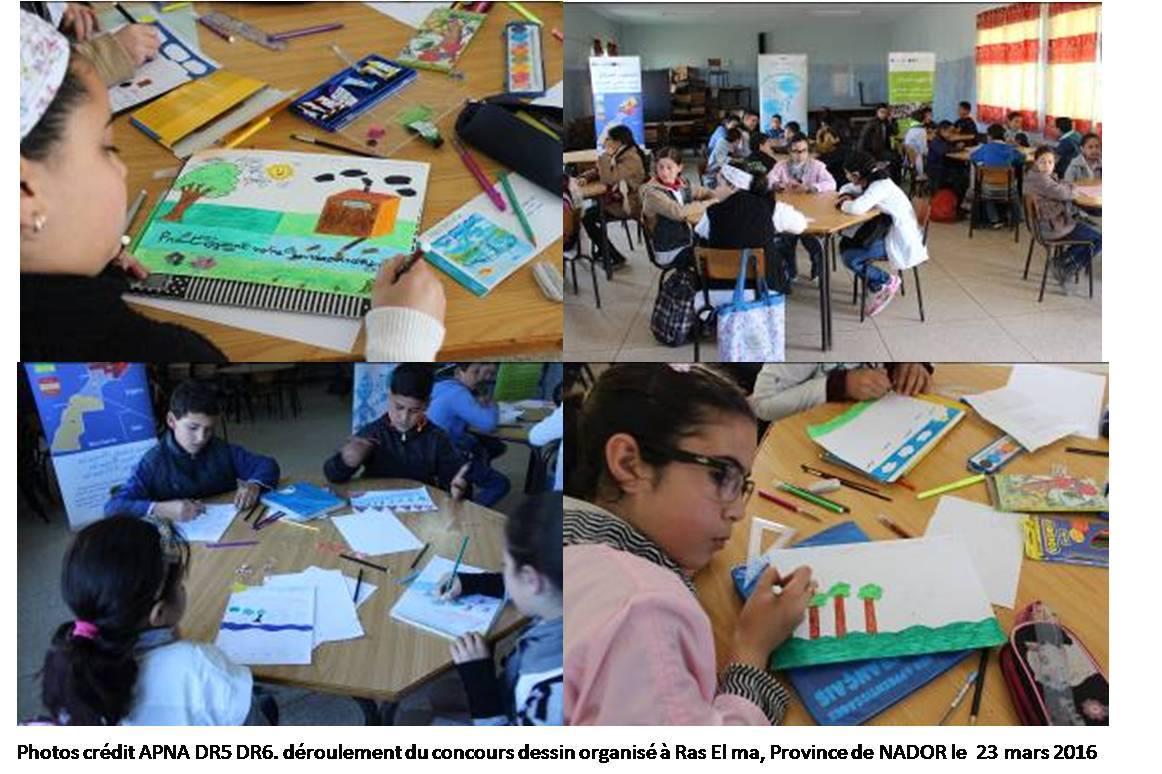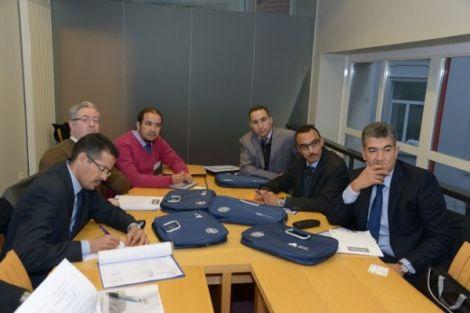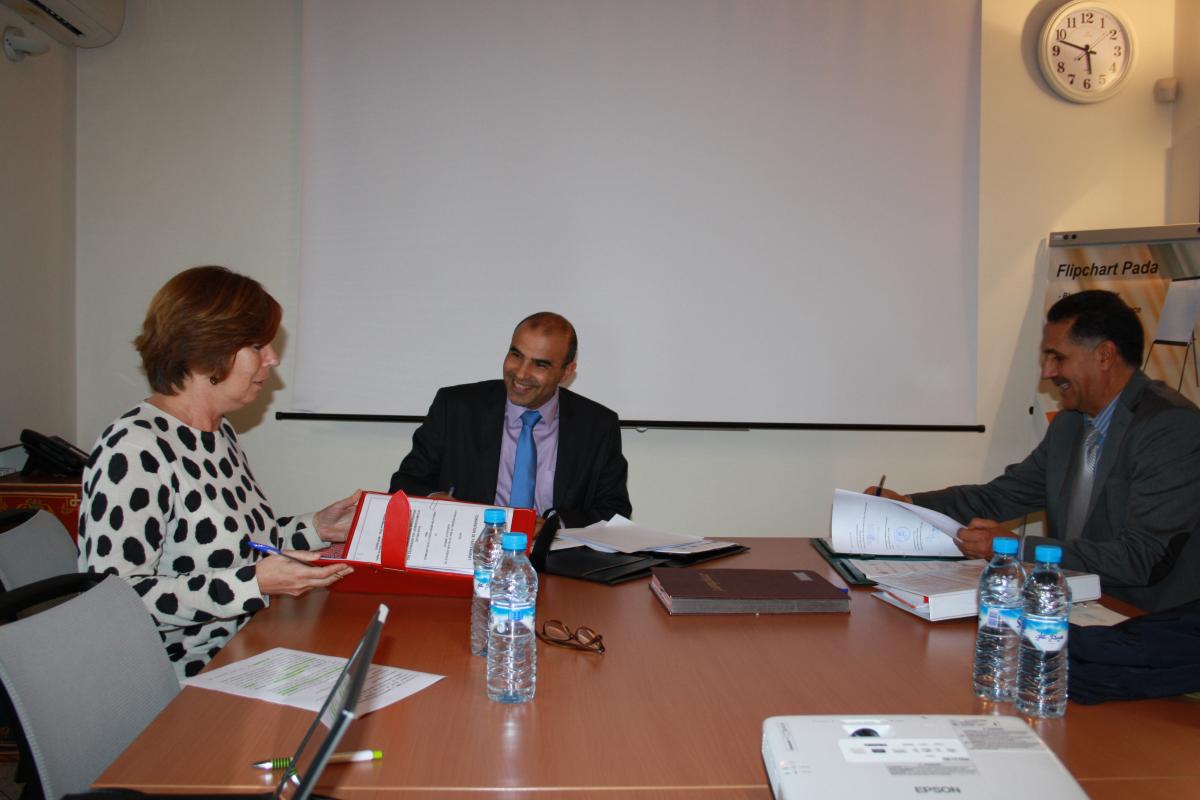Rechercher
Affichage de 1890 à 1905 sur 215 actualités
-

La journée mondiale de l’eau vue par les enfants
Meriem HILALI | 30/03/2016
Le 23 mars 2016 à Ras El Ma, le projet d’Appui au Programme National d’Assainissement Liquide a organisé un concours de dessin sur la thématique de l’environnement pour les élèves des éco-écoles de la ville.
-
Managers de demain
Meriem HILALI | 25/03/2016
Du 16 au 18 mars 2016, dans la province d’Oujda, le "Projet de Développement de la Filière l’Amandier dans la Région de l’Oriental" a organisé des formations au profit des producteurs d’amandes sur la création, la gestion administrative, technique et commerciale des organisations professionnelles (Coopératives et Groupements d’Intérêt Économique). Mieux formés, ils pourront revendiquer leur place comme acteurs responsables à part entière et gérer leurs organisations en managers.
-

Floraison de l'amandier
Meriem HILALI | 03/03/2016
Dans l’Oriental, les amandiers commencent leur floraison. Pour le projet de développement de la filière des amandiers, on se prépare à assister à un spectacle magnifique : ce sont plus de 6000 ha d’amandiers qui ont été plantés depuis 2012. Trois mille agriculteurs sont concernés. Ils se préparent à recueillir les fruits de leur labeur puisque les 2000 premiers ha plantés vont déjà donner des amandes. Le succès auprès des agriculteurs de l’Oriental est tel que le gouvernement marocain a décidé d’investir 2 millions d’euros supplémentaires dans les plantations qui devraient garantir d’ici la fin du projet, en 2018, une amélioration durable de leurs revenus.
-

Gestion stratégique portuaire
Meriem HILALI | 29/02/2016
C’est dans le port d’Anvers que nous avons rendez-vous avec six directeurs marocains du Ministère de l’Équipement, du Transport et de la Logistique. Ils y ont suivi un atelier portant sur la stratégie portuaire, organisé par l’APEC (Antwerp/Flanders Port Training Center). Cette formation de 5 jours a été élaborée à la carte, suite à une demande de l’autorité portuaire marocaine qui désire fournir à ses cadres une expertise de haut niveau pour mettre en place une stratégie efficace de gestion des ports du pays. Les acquis de cette formation et les échanges d’expériences avec le port d’Anvers lui permettront d’adapter sa stratégie portuaire dans ce secteur en pleine expansion au Maroc. Cette formation s’inscrit dans la cadre de la collaboration entre le Programme de Renforcement des Capacités (Bourses) et le Ministère marocain de l’Équipement, du Transport et de la Logistique.
-
Renforcer l'autonomie des femmes rurales
Meriem HILALI | 23/02/2016
Au Maroc, la Belgique appuie l’approche stratégique du pays en matière d’agriculture, qui repose sur deux piliers majeurs : l’agriculture moderne et solidaire.Dans le cadre du développement de la filière du safran dans la Région Souss-Massa-Drâa, un accent particulier est mis sur les femmes rurales, qui jouent un rôle-clef dans la production de safran. Souvent, ces femmes ne sont pas alphabétisées ou ne connaissent pas leurs droits. C’est la raison pour laquelle la CTB et son partenaire, l’Office régional de Mise en Valeur agricole de Ouarzazate, ont conclu un partenariat le lundi 22 février 2016 avec l’association Migrations et Développement. Cette association est active depuis des décennies dans la région pour répondre aux besoins des populations fragiles de la zone de production du safran, en apportant une attention particulière à la prise d’autonomie par les femmes. Grâce à des actions de sensibilisation et d’alphabétisation fonctionnelle, elle donne confiance aux femmes et les rend plus fortes dans leurs relations avec le marché.Le partenariat entre la CTB, l’ORMVAO et Migrations et Développement soutiendra l’organisation des femmes en coopératives structurées et professionnelles. Elles deviendront des acteurs-clef de la filière safran en plein rayonnement.


